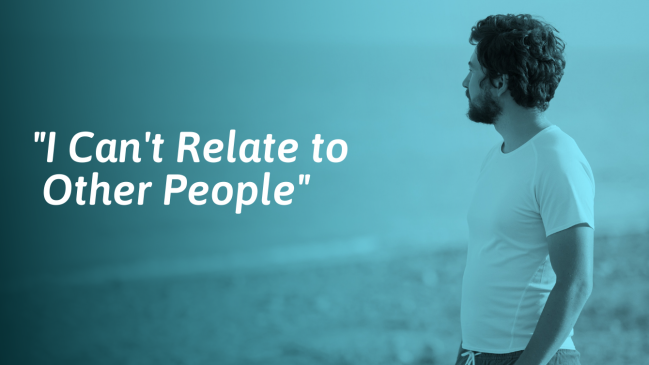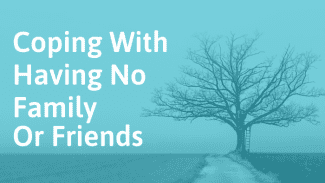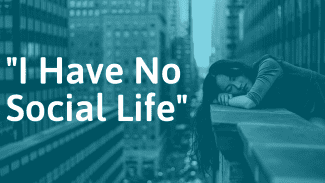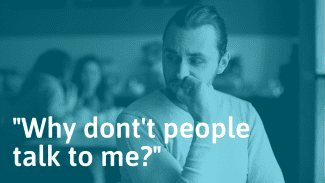Socializing and being understood are pretty fundamental needs for most people.[1] That makes it especially difficult when you feel that you can’t relate to the people around you. Relating to people means understanding what they are experiencing because you have had a similar experience yourself.[2]
Why can’t I relate to anyone?
You can struggle to relate to others if you focus on your differences instead of the things you have in common. It is often more about how you understand other people’s experiences than whether you share them. Relating can also be hard after extreme experiences that change how you view the world.
Here are some practical steps you can take to learn how to relate to others more easily:
1. Develop your empathy
Empathy is the ability to understand what another person is experiencing. This is different from relating to someone because it doesn’t require you to have shared a similar experience with them. Instead, you try to imagine the situation they are in and how that would feel.
Once you understand intellectually, you can start to share their feelings. Try to think about the emotions you would feel in that situation and compare those assumptions to what the other person is telling you or showing you. If there’s a big mismatch, you’ve probably misunderstood.
Empathizing with someone who has experienced things we can’t relate to directly helps us to understand a wider range of emotional experiences and responses. As your empathy for other people develops, you will often notice more similarities than you expected.
2. Don’t let your beliefs isolate you
Sometimes we hold a belief or value so strongly that it gets in the way of our being able to relate to others. We feel that it’s so central to our existence that anyone who doesn’t share it can’t possibly understand us.
Most of us have some beliefs that are non-negotiable, and that’s OK. For example, a friend of mine recently ended a long-term relationship when he found out that his girlfriend was a holocaust denier. Beliefs become a problem when they are exclusionary and isolate you. This is more common when you’re part of an online community that shares your belief and likes to poke fun at “outsiders.”
Some beliefs or values can make you feel as if you can’t relate to society at all. You don’t have to change your beliefs, but you might want to change how you think about people who don’t hold them. Psychologists talk about the “outgroup homogeneity effect.” This is where we assume that people who in a different group to us are all very similar.[3]
Overcome this by trying to get to know people who hold different beliefs to you. Try not to make assumptions about what they are like. Focus on trying to learn more about them. You might find other things that can help you to relate to them on other issues, even if you continue to disagree on your strong belief.
3. Value your similarities
Growing up, I was the odd kid. I was the brainy one who hated sports, wore all black, and listened to metal music. I was focused on what made me different and hated being reminded of the ways in which I was just like everyone else.
I’ve mellowed over the years. I still wear mostly black, and I still love heavy metal, but now I focus more on the ways in which I’m connected to other people. A lot of that is down to my friend Arial.
Arial is the most inclusive person I’d ever met, and the happiest. She can find something in common with everyone she meets. Watching her, I realized that her uniqueness came from the range of things that she accepted, rather than being based on what she wanted to reject.
Being positive about the things you have in common with other people can make it easier to relate to them.
Actively look for similarities
When you are in conversation with a new person or someone you don’t know well, try to find at least three similarities between you. These could be places you have visited, subjects you studied in college, pets, musical taste, or even foods that you both enjoy. This can make it easier for you to relate to them and also gives a purpose to small talk.
Advanced skills
Once it’s become easier to find things that you have in common, you can move on to trying to understand the feelings behind those things. This is a little harder, so take your time. Try to understand how the other person feels about those topics. Someone who shares your love of BBQ, for example, might also share a love of being outdoors and the feeling of freedom. Understanding the emotions behind shared interests can make it easier to relate.
Make sure that you are also sharing information about yourself and your feelings as well. You don’t want it to come across as an interrogation.
4. Be honest when you can’t relate
Struggling to relate to others can feel especially uncomfortable when we struggle to relate to people we feel we should understand. This might be that you’re not able to relate to anyone your age, to your family, or to peers at work or at college.
One reason it feels particularly awful when we can’t relate to these groups is that we assume that we share most of the same life experiences. That was probably a reasonable assumption in grade school, but it often doesn’t apply when we’re trying to relate to other adults, and especially as the world has become more diverse. Many of my friends have children, for example, while I’ve chosen to stick to having a puppy. I can’t relate to their experiences as parents, and I never will.
Although having different experiences can be a barrier to relating to people, it can also offer an opportunity. Showing that I respect the ways in which their experiences are different but relating as much as I can lets us both feel validated. If a friend is talking to me about how they’re feeling really sleep-deprived with a new baby, I might say:
“Wow. That sounds awful. It was bad enough when we were at college and had to pull an all-nighter. I can’t imagine how much worse it must be to have that night after night.”
In that comment, I’ve shown that I understand part of their experience but also acknowledged that they are going through something that I can’t relate to directly and that I respect that. This can help to form a deeper friendship and make it easier for us to relate.
5. Practice understanding vastly different people
Relating to people who are very similar to you is much easier than relating to those who are very different. Spending some time trying to understand people with a completely different worldview to yourself can help you to pinpoint similarities better.
Try to approach new people with an attitude of respectful curiosity. When you’re trying to understand something you’ve never experienced, it’s important to be careful not to be rude or too intrusive, especially if you are talking to someone from a marginalized group.
When talking to someone from a marginalized group, remember that you’re trying to understand them as a person, not the group. Remind yourself that they’re not a spokesperson for their group. Like you, they are a complex person.
If you struggle with this, try to imagine what it would be like if all anyone ever asked you about was the company you worked for, and was surprised to learn that your opinions weren’t the same as every other employee.
Expand your range of experiences
If you find it difficult to meet people who are very different from yourself, it can be helpful to try out new experiences. These will often let you meet lots of different people from a range of backgrounds. Remember that the wider your range of experiences, the more likely it is that you’ll share some of them with anyone you meet. We have a list of suggested activities for introverts to get you started.
6. Relate to the emotion, not the facts
When we struggle to relate to others’ emotions, it’s often not because we haven’t experienced that emotion ourselves. Instead, it’s because we can’t see how or why the events described would lead to that emotion.
For example, I know how it feels to feel successful. I remember how it felt when I was accepted into Oxford. I felt really proud and on top of the world. Intellectually, I understand that other people get that same feeling when their sports team wins a match, but I can’t see a path from the event to the emotion.
What I’ve learned is that the path, and even the event, are mostly irrelevant. The emotion is the important bit. If I focus on the why, I start to feel standoffish and (although I don’t like to admit it) a little bit superior. When I focus on the fact that my friend is feeling pride and joy and success, I can relate to their emotion and be happy for them.
Try not to get hung up on the why and focus on the emotion the other person is feeling. Imagine, or remember, how it felt to experience that emotion, no matter how different the circumstances might have been.
An example of this happened when I was talking to a male friend about how it felt to be harassed in the street. At first, he focused on why it made me feel unsafe and angry. He wasn’t relating. Instead, he was thinking about how he would feel about being in a similar position.
It wasn’t until I compared it with how he’d felt as a child, being bullied by a big group of older boys, that he started thinking about how it felt to feel scared as a woman in that situation. At that point, we were able to relate properly, and I felt much more comfortable opening up to him.
7. Understand that some experiences mark you
Some life experiences can make it feel particularly difficult to relate to people who haven’t experienced something similar. These are usually events where you have seen the darker side of humanity, for example serving in the military or being the victim of child abuse or domestic violence.
One of the most common effects of traumatic events is hypervigilance.[4] This is where you are constantly on alert for threats, and situations that others find relaxing or fun can be deeply stressful.
Try to remember that this is a normal response to your experiences. It’s also completely normal to feel resentful of how much easier life can be for people who haven’t been through the same things.
Support groups can be helpful. They allow you to spend time with people who share your situation, but they can still leave you struggling to relate to ‘normal’ people. Finding a good therapist can help you to open up about how your life has affected you, and most therapists will work with you to help you relate to other people.
There are lots of options out there for finding therapists, including many that are affordable. There’s also advice online explaining how to choose a therapist and what kind of practitioner might be best for you.
8. Seek help for underlying mental health issues
Lots of mental health issues or neurodivergent conditions can lead you to have difficulty relating to people. These include depression, autism, and ADHD, among others.[5, 6] Whilst there are many suggestions for self-care and ways to alleviate symptoms of mental disorders, professional treatment is usually needed to address the underlying problem.
If you think that your difficulty relating to others might be due to some form of mental health issue, it is usually worth talking to your doctor as your first step. They can offer suggestions and refer you to someone who can help.





